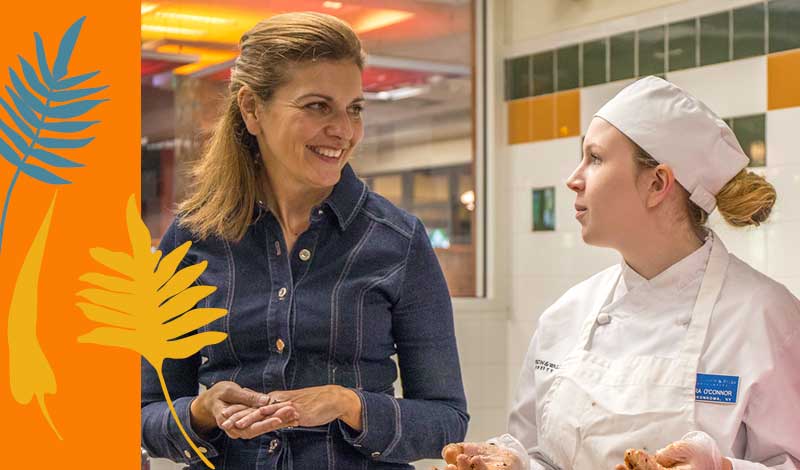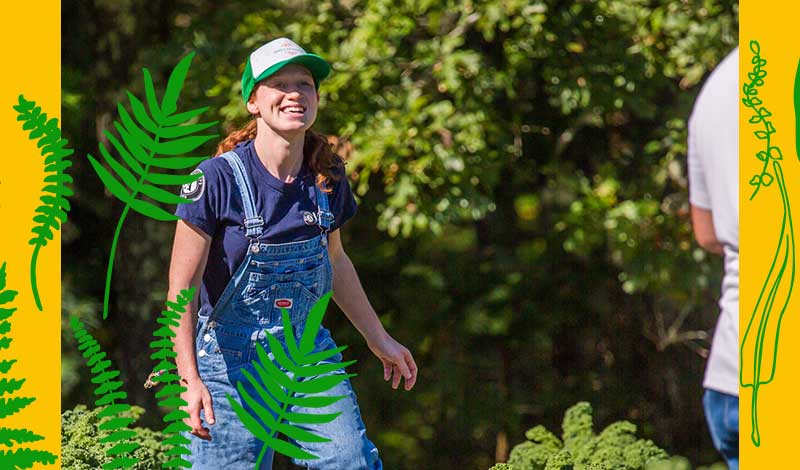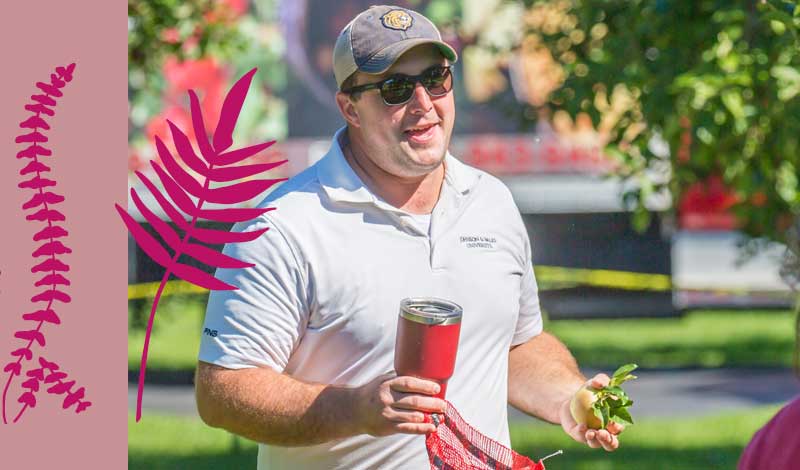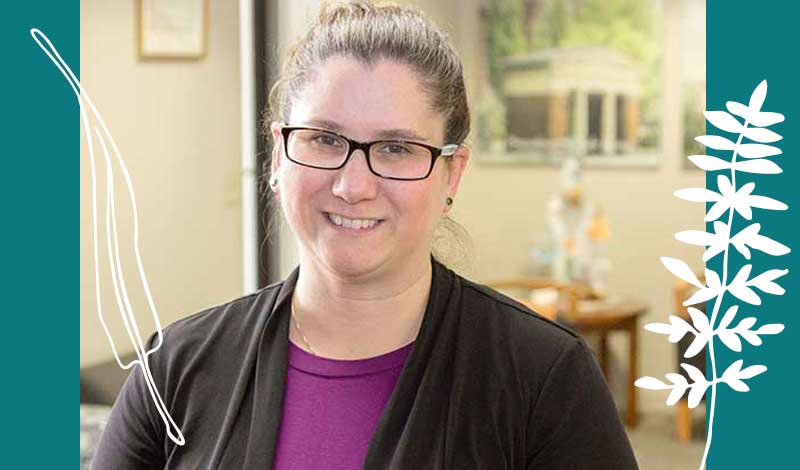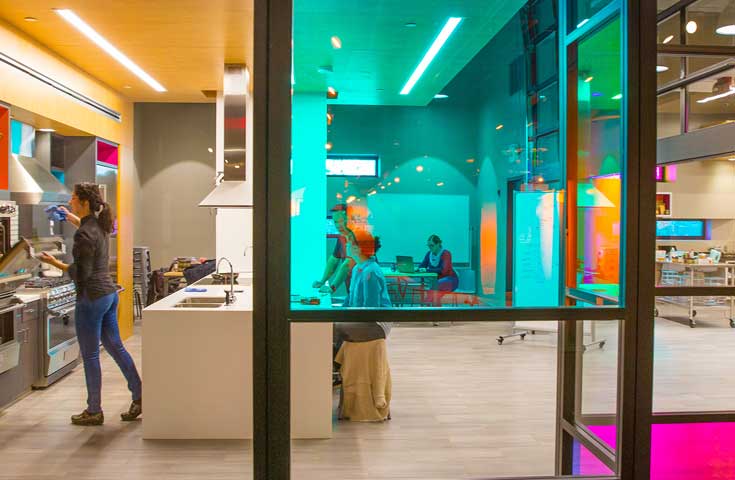Johnson & Wales University is going green inside and out, and the shift — from the cafeteria to the curriculum — is viewed by faculty and students alike as a necessity for survival in a changing world.
This fall, the new College of Food Innovation & Technology (CFIT) launches and will include a bachelor’s degree program in Sustainable Food Systems offered at the Providence Campus and a master’s degree through the JWU Online. In 2021, a master’s program in Food Innovation and Technology will likely be offered online.
“This degree will forge new pathways to healthier eating, healthier societies and more sustainable food systems.” Associate Professor Branden Lewis '06
The new B.S. in Sustainable Food Systems will be one of the first of its kind in the world, with a mix of labs and classroom training that ranges from culinary and environmental sustainability to public health, public policy and advocacy, says Associate Professor Branden Lewis '06 who serves as academic lead for the new program. “This degree will forge new pathways to healthier eating, healthier societies and more sustainable food systems.”
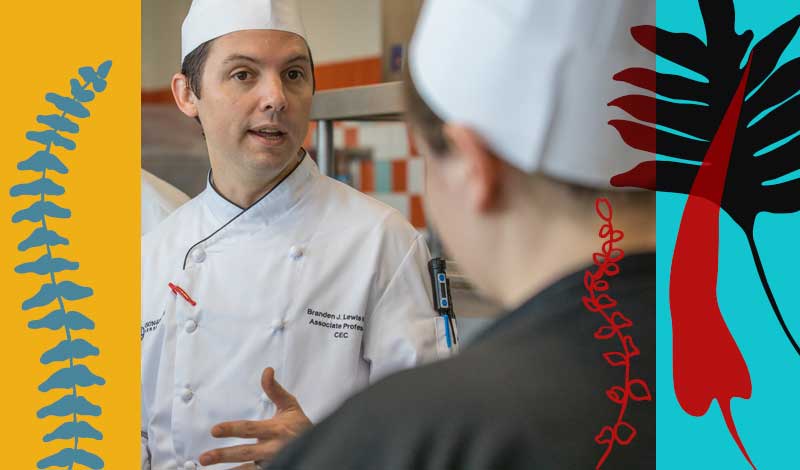
We want to provide students with the critical mindset that the future will require. Our students need to adapt to a changing world — one that’s evolving much faster than expected.Providence Campus President Marie Bernardo-Sousa, L.P.D.,’92
“First and foremost, this is motivated by our mission and guiding principles,” which include a commitment to “undertake continuous improvement and planning for a sustainable future,” says Providence Campus President Marie Bernardo-Sousa, L.P.D.,’92. “We want to provide students with the critical mindset that the future will require. Our students need to adapt to a changing world — one that’s evolving much faster than expected. Most restaurants and companies, from a business and financial perspective, think this is something they have to do.”
According to Lewis, while there are similar programs at other schools that concentrate on agriculture and the natural environment, the JWU curriculum is unique in its focus on food prep and food systems: “An applied food systems program is novel, and we’re going to be able to do it better than anyone else.”
Since 2011, the school has offered a wellness and sustainability concentration as part of its Culinary Arts program, teaching prospective chefs about plant-based and “conscious” cuisines. The program’s broad-based curriculum reflects a need for “big-picture” systems thinking needed to solve environmental problems that haven’t even been recognized yet, Lewis says. “Environmental evolution has taken millions of years to develop,” he explains. “Nature is the perfect system — nothing is wasted. What we're looking to get out of this program are the leaders of tomorrow.”
Ruth Solomon '19, is one of those leaders. The head of Student Activists Supporting Sustainability (SASS) during her time at JWU, Solomon worked tirelessly to reduce waste on campus, efforts for which she was honored as the school’s Centennial Women of the Year Award in her senior year. A chance encounter at a SASS used-clothing swap with Eva Agudelo, head of the local nonprofit Hope’s Harvest, led Solomon to alter her academic focus from food production to waste prevention and sustainability.
Solomon interned with the group, which gathers surplus crops from Rhode Island farms and distributes them to food pantries and soup kitchens. “That changed my whole perspective on what I wanted to do at JWU,” she says. “I gained so much real-world experience and was able to jump right into this field after graduation.” Solomon continues to volunteer with Hope’s Harvest, which has distributed more than 90,000 pounds of produce during its first two years of operation, as well as advocating for composting and other waste-reduction strategies at the local restaurants where she works as a chef and server.
“We have to change the way we teach and learn so we can change the way we eat,” says Lewis. “The chef can become a change agent through meal design, sourcing and by deciding who works in the kitchen and who gets to eat the food. We have the responsibility to change the food system and make it economically sound for the sustainable future.”
The curriculum shifts are in response to hospitality industry needs as well as student demand, says Bernardo-Sousa. “We’re starting to see Generation Z students coming into our classrooms, and they are even more passionate about these issues.”
“Strategically, sustainability is an important topic for students and prospective students,” adds Joe Magennis, director of university marketing. “They are much more environmentally and socially conscious than previous age groups, and their college choice decision includes an awareness of these factors. We have also come to realize that students may come to JWU without a deep knowledge of sustainable practices, but once they’ve been exposed to them, it has a significant impact on their career choices.”
That passion is propelling conservation efforts, which have greatly accelerated in the past decade. “When I was a student here 15 years ago I don’t think anyone was thinking about this stuff,” says Matt Fannon '08, '14, JWU’s Sustainability and Energy Conservation manager. “It really has developed over the last few years.”
Yet the school’s commitment to creating a greener, cleaner, more efficient and sustainable campus environment is not new. A significant portion of the Harborside Campus, for example, sits on reclaimed industrial land that was formerly part of the Providence Shipyard, which built Liberty Ships during World War II. Federal “Brownfields” and EPA cleanup grants received by the school in 2005 and 2006 helped pave the way for converting polluted parts of Fields Point into the Harborside Campus, including academic buildings, residence halls and other facilities.
One of these, the Cuisinart Center for Culinary Excellence, is among four Leadership in Energy and Environmental Design (LEED) gold-certified buildings on the Providence Campus, along with Harborside’s Grace Welcome Center, the Center for Physician Assistant Studies, and the John J. Bowen Center for Science and Innovation.
“This is a legacy we leave our campus community,” says Bernardo-Sousa, who cited the LEED-certified buildings as a “wonderful example of how we manage our facilities.”
The Energy Conservation Office (ECO) spearheaded the successful LEED certification process and a campaign to reduce the use of electricity, gas and water, with the Providence Campus receiving an Energy Excellent Award from Cenergistic Energy Conservation in 2017. More than 40,000 LED lights have been installed on the Providence Campus, which helped reduce electric use by 16 percent and saved more than $4 million in energy costs between 2013 and 2018.
The next year, the Providence Campus entered into an agreement with National Grid for a Strategic Energy Management Plan (SEMP) aimed at further reductions. In just the first six months of the SEMP program, the school was more than halfway to its three-year goal of reducing electric use by one million kilowatt hours (Kwh), saving $105,000 per year in part by installing motion-active lights in every stairwell on campus. Over the same time span, the school notched 23 percent of its three-year goal of reducing 100,000 therms (the measurement of the amount of heat energy in natural gas equal to 100,000 British Thermal Units) of gas use. JWU also inked a “remote net metering” deal in December 2018 in order to purchase renewable energy at a discount.
“JWU is the first private university in Rhode Island to be using wind turbines and solar to offset its electric usage,” says Fannon. “We are working to have 100 percent of our buildings offset by these types of projects by the end of 2020.”
Other ECO-led endeavors include reducing paper use, increased recycling, and donating goods that otherwise might end up in landfills. In 2018, JWU Providence began recycling plastic films like shopping bags and plastic wrap, partnering with Trex decking to collect more than 1,000 pounds of plastic, part of which was used by the company for a bench that was donated back to the school.
At the annual spring Move Out and Donate campaign, students contribute thousands of pounds of goods to Goodwill New England and the Rhode Island Food Bank, which included 1,367 pounds of household items and 8,369 pounds of clothing collected in 2018. A surplus sale sent used but usable televisions, furniture and culinary tools to new homes rather than the trash.
“We try to identify as many things as possible that we can remove from landfill waste and recycle,” says Fannon.
Students get involved in recycling projects not just by donating, but by leading efforts to reduce the wastestream. SASS, for example, runs the “$5 Fillup” program, selling bags of clothing donated on move-out day at a nominal cost.
“What’s impressed me about Johnson & Wales is the drive that many students have for a more sustainable lifestyle,” says SASS President Carly Hanellin '20. At a school where food is central to academic life, SASS members have also been deeply involved in raising food sustainably and reducing food waste. SASS, the Club of Culinary Excellence, the Energy Conservation Office and Cooking Asia JWU have collaborated to build garden beds to grow and harvest fresh produce on the Harborside Campus so that students, professors and chefs to have direct access to fresh vegetables, fruits, herbs, and flowers.
Chefs have to learn by repetition, but the downside is that JWU’s culinary labs produce thousands of pounds of excess food annually. Now, lab food is racked and “triaged” according to whether it can be used to make stock, donated, or composted, according to Bridget Sweet, JWU Providence’s executive director of food safety.
In 2017, JWU Providence was recognized by the Environmental Protection Agency (EPA) for its efforts to reduce food waste by working with a local pig farmer to compost discarded food from culinary buildings and dining halls. The school also donates prepared food to Elisha Project’s Food Rescue program, which then distributes it to those in need. Labs also frequently host free family-style dinners for fellow students who might themselves be confronting food insecurity.
Sweet, who came to JWU with a background in regulatory food inspection, admits she was initially alarmed about the idea of donating food from the culinary labs. “[In my work prior to Johnson & Wales], I had seen so many violations for food that was going to be served immediately, never mind food that wasn’t,” she says. “But I was exposed to the bigger picture when I followed the food donation process and saw it could be done safely.”
In addition, first-year students now receive reusable drink bottles with the aim of cutting down on single-use plastic water bottles, and the paper plates and cups previously used in labs have been replaced with washable dishes. Plastic straws and bags have been eliminated from cafeterias, and cookies are no longer cocooned in plastic wrap.
Cafeterias have also instituted “trayless dining” to cut down on food waste. “When you have a big tray, you tend to take a little bit of everything,” explains Sweet. “If you don’t have a tray, you can only carry so much. It forces you to get up more frequently and to take less.”
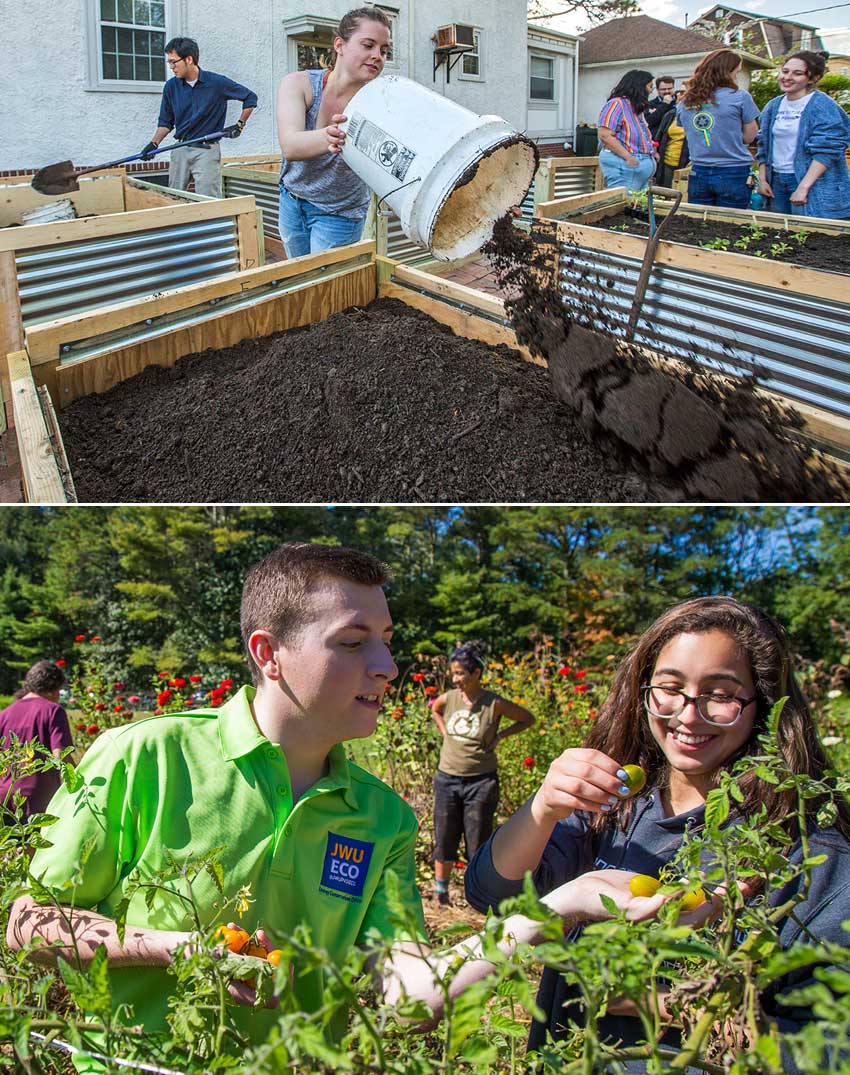
According to Sweet, taking steps toward sustainability is “the right thing to do, but it’s also important to students.” And Fannon says that student interest in the school’s annual Sustainability Week has been growing exponentially: “Students are generating some of these ideas and want to be leaders on this.”
That bodes well for the next generation of students, who will enter the workforce at a time when sustainability has become a necessity, not a nicety.
“Ultimately,” says Bernardo-Sousa, “it comes back to moving in the right direction — working with students to ensure that they are ready to meet the needs of their industry as they move forward in their careers.”
